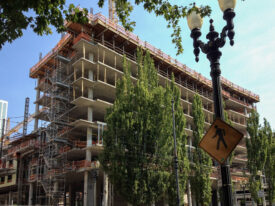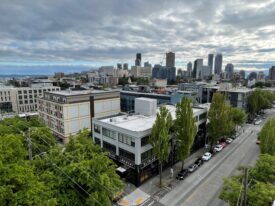April 21, 2023
MEDIA CONTACT: Dan Bertolet, Director, Housing and Urbanism Program, Sightline Institute, dan@sightline.org
OLYMPIA, WA – Washington communities have a far better chance of meeting the housing needs of their residents and local job holders, and the state has the tools to make a dent in the housing shortage overall, thanks to a suite of bills the state legislature has passed in recent days. A deficit of homes is driving up prices and rents. And as the Department of Commerce estimates that Washington needs one million new homes within the next 20 years to make up for decades of underbuilding, these measures—large and small—will go a long way to address the state’s acute shortage of homes and affordability crisis.
“Washingtonians won this session,” said Dan Bertolet, Director of the Housing and Urbanism program for Sightline Institute, a Pacific Northwest regional think tank. “Whether it was cutting red tape and construction costs or ensuring our cities allow more affordable options near transit and jobs, these bills, working together, mean more homes, at more affordable prices, in communities all across our state.”
Sightline sums them up below, with a longer analysis to follow in coming weeks:
- HB 1110 legalizes middle housing options like duplexes, fourplexes, or sixplexes, depending on city size and proximity to transit, on most residential lots in Washington’s urban communities.
- HB 1337 makes it easier for homeowners to add accessory dwelling units (ADUs), also known as “backyard cottages” and “bonus homes,” by ending renter bans (requirements for owners to live on-site), capping impact fees and parking mandates, legalizing two ADUs per lot, and setting baseline standards on lot and ADU size.
- HB 1042 loosens restrictions on adding housing within existing multifamily buildings by exempting the added units from parking mandates, density limits, and other potential barriers.
- SB 5491 legalizes single-stair apartment buildings, or “point access blocks,” up to six stories, but requires the State Building Code Council to develop recommendations for these buildings and adopt the changes by July 2026.
- SB 5258 reforms regulations for small-scale condos, specifically laws on construction defect actions and warranties, deposit requirements, and local government planning, and exempts first-time homebuyers from the real estate excise tax.
- SB 5058 also helps small-scale condo development, exempting buildings with 12 or fewer units and no more than two stories from the definition of “multi-unit residential building,” which eliminates building enclosure design and enclosure inspection requirements that add excessive costs to small scale-condo developments.
- HB 1181 makes a broad set of changes to the Growth Management Act to address climate change, including a provision for local governments to legalize higher-density housing.
- HB 1293 streamlines local design review processes, requiring them to use “clear and objective” standards that don’t reduce development capacity otherwise allowed. In addition, the process cannot require more than one public meeting.
- HB 5412 reduces unnecessary environmental review of homebuilding proposals, exempting from State Environmental Policy Act review proposed housing developments within urban growth areas that comply with local Comprehensive Plans.
- SB 5290 supports local governments in streamlining their permit processes for new housing, establishing grant programs for them to reduce permit review timelines and to support local governments’ transition from paper-based to software/web-based systems.
- HB 1074 establishes rules to ensure landlords fairly and promptly return tenants’ damage deposits after they move out.
- SB 5197 modifies eviction notice and eviction legal process requirements to give tenants more options and leeway.
- HB 1474 supports first-time homebuyers harmed by historical discriminatory covenants. It establishes a Special Purpose Credit Program, funded by a $100 document recording fee, to provide down payment assistance and closing cost assistance to first-time homebuyers with income less than the area median who were themselves, or are descendants of someone who was, excluded from homeownership in Washington by a racially restrictive real estate covenant prior to April 11, 1968 (passage of the Fair Housing Act).
- HB 1771 strengthens the rules governing relocation assistance provided by the Mobile Home Relocation Assistance Program for displaced mobile home park residents.
- SB 5198 strengthens rules to give mobile home owners the opportunity to purchase mobile home communities when owners propose closure or conversion.
- HB 1695 clarifies the definitions of affordable housing that qualify as a “public benefit” to authorize governments and public agencies to sell publicly owned surplus property at discounted prices for affordable housing development.
- SB 5301 makes a number of technical and bureaucratic updates to how the Department of Commerce manages various affordable housing subsidy programs, improving overall management.
- SB 5045 creates a property tax exemption for ADUs to owners who offer them at rent affordable to people making 60 percent of the area median income.
- HB 1326 reduces utility costs for affordable housing by authorizing local waivers of utility connection charges for affordable and supportive housing owned by nonprofits and housing authorities.
###
Dan Bertolet is Director of Sightline Institute’s Housing and Urbanism program. View his latest research, and follow him at @DanBertolet. (Last name pronounced “BER-də-lay.”)
Sightline Institute is an independent, nonprofit think tank providing leading original analysis of housing, democracy, forests, and energy policy in the Pacific Northwest, Alaska, British Columbia, and beyond.






